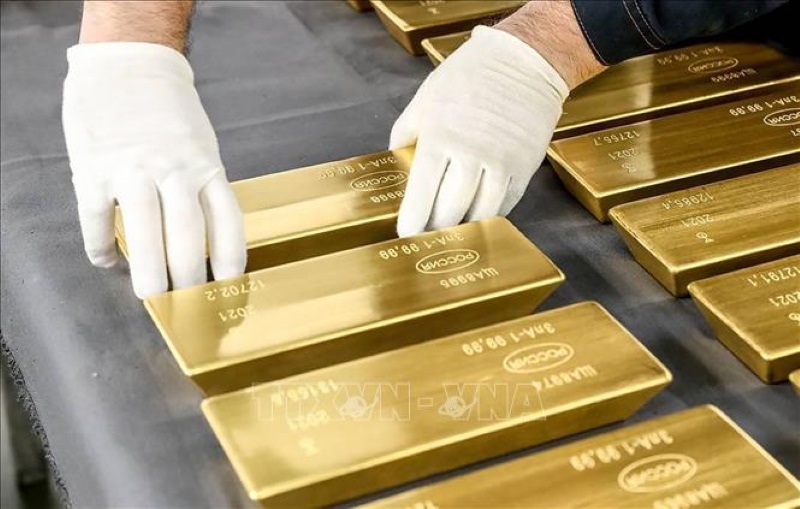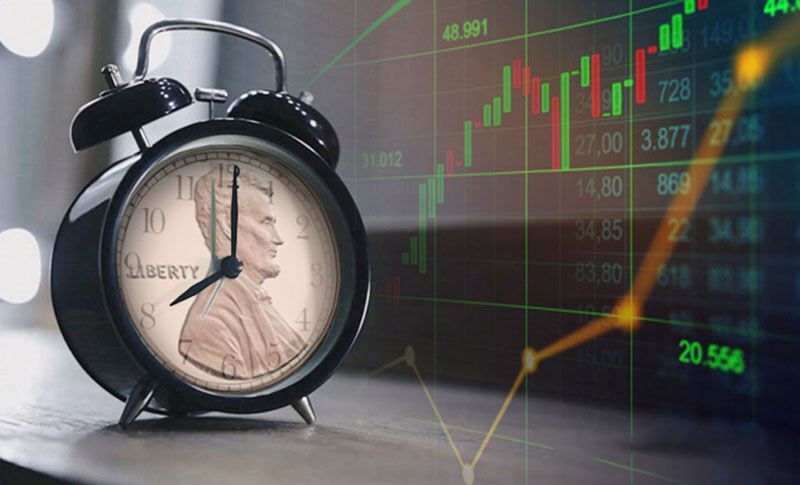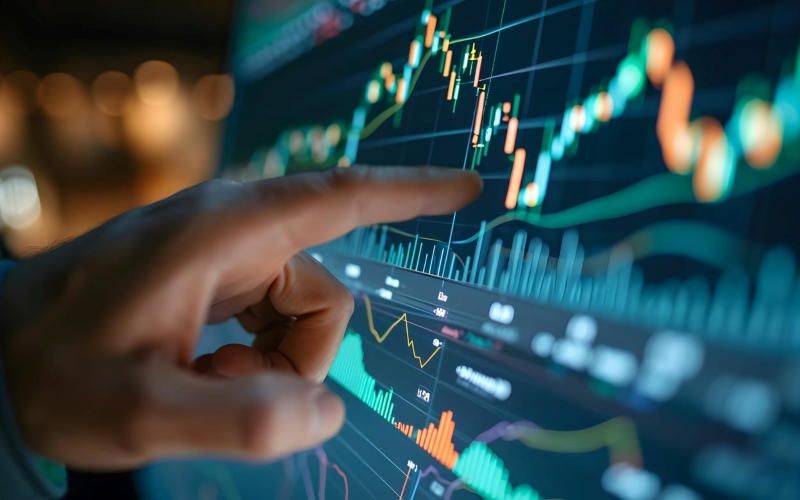Inflation should buy gold? This is a question that many investors are concerned about when there is instability in the economy. Let's find the answer to this problem with HVA.
1. Inflation and gold prices?
Inflation occurs when the value of money decreases, resulting in a sustained increase in the prices of goods and services over a long period of time, usually measured in percentage terms. The main cause is that the amount of money in the economy exceeds what is needed, causing the value of the currency to decline.
Inflation is divided into three main levels:
- Natural inflation: An inflation rate of 0 to below 10% per year is considered positive and promotes economic growth. Countries usually try to keep this inflation rate below 5%.
- Hyperinflation: The annual price increase rate from 10% to less than 1000%, causing many disadvantages for the economy, hindering investment and forcing the Government to intervene with monetary policies to control it.
- Hyperinflation: An increase in price rate above 1000%, which often occurs during severe economic crises, can lead to financial collapse and seriously affect social life.

Inflation reduces purchasing power, making the same amount of money buy fewer goods, forcing consumers to cut back on spending and prioritize essential needs. This has a negative impact on production and business of enterprises.
When inflation is below 5%, the economy is considered stable, creating favorable conditions for business development and other investment channels become more attractive than gold. However, when inflation exceeds 5% to 10% or higher, gold emerges as a safe asset. Not only individual investors but also countries increase their gold reserves to protect asset value in the context of economic instability.
2. The relationship between gold prices and inflation
To know inflation should buy gold If not, then first understand the relationship between them. Inflation reduces the value of money, causing prices of goods and services to rise, while reducing purchasing power. In this context, gold is often seen as a safe asset, protecting the value of assets against currency depreciation. This explains why gold prices tend to increase when inflation increases, due to the increased demand for gold by people.
Unlike currencies, gold is a tangible asset with intrinsic value, affected by the laws of supply and demand and market fluctuations. For example, if you hold gold instead of cash, the value of your assets may be better maintained over time, even if inflation occurs.

However, The relationship between gold prices and inflation not always fixed. When inflation is under control and the economy is stable, the price of gold may not increase or even decrease, because people have less demand for gold as a safe investment channel.
In short, gold prices and inflation have a complex relationship, depending on various factors such as interest rates, global economic conditions and market sentiment. However, in times of high inflation, gold is often considered an effective option to preserve asset value.
3. Why inflation buys gold
So inflation should buy gold Gold has long been seen as an effective hedge against inflation. Historically, gold prices have tended to rise as inflation increases, as gold retains its real value over time, unlike currencies, which can lose value due to inflation.
Investing in gold is a way to protect assets and has the potential to generate long-term returns, especially when compared to holding cash or savings, which are susceptible to inflation.

When inflation escalates and the value of money declines, investors often turn to gold as a safe haven for their capital, helping to generate stable returns. Therefore, gold is always recommended as an effective investment strategy during times of high inflation.
4. Gold inflation increases or decreases.
During times of inflation, the price of gold is often seen as an indicator of the state of the economy and is a financial investment channel safe. However, inflation gold price increase or decrease It is not always one-way but depends on many factors.
Studies show that, depending on historical periods, gold prices and inflation may not always move in the same direction. In the long term, inflation can outpace gold price increases, so gold remains a hedge against inflation, even if the impact is not direct, according to Önder Ciftci, founder and CEO of gold company Ophirum.
He also noted that when inflation is high, people often look to invest their money in assets with lasting value such as real estate, art or gold.

4.1 Why Does Gold Usually Increase in Price During Inflation?
- Currency devaluation:
When inflation occurs, the value of money decreases, reducing the purchasing power of the currency. Gold, as a finite asset that does not depreciate over time, often becomes an investment choice to protect the value of assets. - Market psychology:
Inflation causes investors to lose confidence in currencies and turn to gold as a safe investment channel, thereby increasing demand and pushing gold prices up. - Financial policy:
If central banks print more money or keep interest rates low to stimulate the economy, this also contributes to rising gold prices during inflationary times.
4.2. When Can Gold Fall in Price Despite Inflation?
- Controlled inflation:
If inflation is under control and the economy continues to grow steadily, demand for gold may decline, and investors may turn to other income-producing assets such as stocks or real estate. - Interest rate increase policy:
When inflation is high, central banks can raise interest rates to curb inflation. This increases the appeal of other financial assets such as bonds and causes gold prices to fall. - Supply and investment sentiment:
Gold prices are also affected by external factors such as mine production, geopolitical volatility, and market sentiment. If the supply of gold increases or there is no significant economic instability, gold prices may fall even if inflation occurs.
Although gold tends to increase in price during inflationary periods due to its role as a safe haven, this is not always the case. Gold prices depend on many factors such as inflation, fiscal policy, and market sentiment. Therefore, investors need to conduct a comprehensive analysis and consider carefully before deciding to invest in gold during inflationary periods.
5. Is gold inflationary?
The next question is: Is gold inflationary? Gold is a unique asset class and is not directly affected by inflation like currencies. Inflation occurs when the prices of goods and services increase, leading to a loss of value for money. However, gold is not a currency issued by any country and cannot be printed or its supply easily manipulated. This allows gold to retain its intrinsic value over time, making it a hedge against currency depreciation in an inflationary environment.
Although gold is not affected by inflation in the same way that other currencies or commodities are, its value can still fluctuate due to economic and market factors. For example, when inflation is high, investors often seek out gold as a safe haven, driving up its price. Conversely, if central banks raise interest rates to control inflation, this can cause the price of gold to fall as other financial assets such as bonds become more attractive.
In short, gold is not inflationary in the sense that it loses value, but its market value can change due to the impact of economic, financial and psychological factors on investment. This is why gold is often considered an effective asset protection tool during inflationary times.
6. Risks of investing in gold during inflation
Like any form of investment, investing in gold carries certain risks.
- Gold prices can fluctuate wildly, especially in the short term, due to the impact of supply and demand, interest rates, US dollar fluctuations and market sentiment. Therefore, gold is only really suitable for long-term investors, while short-term investments can lead to losses.
- In addition, gold investors need to pay attention to the cost of storage and insurance of assets, because gold is susceptible to theft or damage. If not stored carefully, the value of gold can also decrease when resold.
- Gold is also affected by policies from the Government and the State Bank, which can lead to unwanted price fluctuations.
Although gold can help protect assets and reduce risks in the context of inflation and market volatility, investors still need to carefully evaluate and understand the risks before deciding to invest. To minimize risks, monitoring, learning investment knowledge and the Government's gold policy is very important, at the same time it is necessary to diversify investments to protect assets more effectively.
Conclude
Gold has long proven its important role as a hedge against inflation and economic instability. When inflation increases, the value of money decreases, making gold a safe and effective investment channel to preserve asset value. However, gold prices do not always increase with inflation, as it is also affected by many other factors such as monetary policy, economic conditions and market supply and demand.
Investing in gold brings many benefits, but at the same time, it also has some potential risks. Therefore, to achieve optimal efficiency, investors need to be fully equipped with knowledge, closely monitor the economic situation and the gold market, as well as combine with other investment strategies to ensure portfolio diversification. Hopefully the information in the article will help you know should i buy gold No, to make more appropriate and effective investment decisions. Don't forget to follow HVA to update more useful knowledge about economics and finance.











